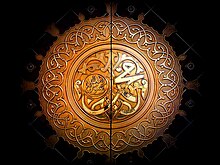मुहम्मद
Appearance
पैगंबर मुहम्मद مُحَمَّد | |
|---|---|
 "ईश्वर के दूत मुहम्मद" मदीना के महजिद के गेट पर लिखल बा | |
| Born | c. 570 |
| Died | 8 जून 632 (उमिर c. 62) मदीना, हेजाज़, अरब (आज के सऊदी अरब) |
| Resting place | निर्देशांक: 24°28′03.22″N 039°36′41.18″E / 24.4675611°N 39.6114389°E |
| Other names |
|
| Years active | 583–609 CE ब्यापारी के रूप में 609–632 CE धार्मिक नेता के रूप में |
| Signature | |
मुहम्मद के मोहर | |
मुहम्मद[n 1] (अरबी: مُحمّد; c. 570 CE – 8 जून 632 CE)[1] इस्लाम के संस्थापक रहलें।[2] इस्लामी परंपरा के मोताबिक, ऊ पैगंबर आ ईश्वर के दूत रहलें आ उनके एह खातिर भेजल गइल रहल कि एक ईश्वर के होखे सनेंसा, जे पहिले आदम, अब्राहम, मूसा आ ईसा के दिहल गइल रहल, ओकरा के लोगन तक फिर से पहुँचा सकें।[2][3][4][5] इस्लाम के लगभग सगरी शाखा आ मत में इनके अंतिम पैगंबर मानल जाला, हालाँकि, कुछ आधुनिक मत के लोग एह बिस्वास के अलग हट के सोचे ला।[n 2] मुहम्मद अरब प्रायदीप के एगो सिंगल रानीतिक इकाई में एकजुट कइले, कुरान आ इनके शिक्षा इस्लाम माने वाला लोग के धार्मिक मान्यता आ आचरण बेहवार के मूल आधार हवें।
नोट
[संपादन करीं]- ↑ पूरा नाँव: Abū al-Qāsim Muḥammad ibn ʿAbd Allāh ibn ʿAbd al-Muṭṭalib ibn Hāšim (अरबी: ابو القاسم محمد ابن عبد الله ابن عبد المطلب ابن هاشم, lit: Father of Qasim Muhammad son of Abd Allah son of Abdul-Muttalib son of Hashim ibn 'Abd Manaf)
- ↑ The Ahmadiyya Muslim Community considers Muhammad to be the "Seal of the Prophets" (Khātam an-Nabiyyīn) and the last law-bearing Prophet but not the last Prophet. See:
- Simon Ross Valentine (2008). Islam and the Ahmadiyya Jama'at: History, Belief, Practice. Columbia University Press. p. 134. ISBN 978-1-85065-916-7.
- "Finality of Prophethood | Hadhrat Muhammad (PUBH) the Last Prophet". Ahmadiyya Muslim Community. Archived from the original on 24 July 2011.
- The Nation of Islam considers Elijah Muhammad to be a prophet (source: African American Religious Leaders – p. 76, Jim Haskins, Kathleen Benson – 2008).
- United Submitters International consider Rashad Khalifa to be a prophet. (Source: Daniel Pipes, Miniatures: Views of Islamic and Middle Eastern Politics, p. 98 (2004))
संदर्भ
[संपादन करीं]- ↑ Elizabeth Goldman (1995), p. 63, gives 8 June 632 CE, the dominant Islamic tradition. Many earlier (primarily non-Islamic) traditions refer to him as still alive at the time of the invasion of Palestine. See Stephen J. Shoemaker,The Death of a Prophet: The End of Muhammad's Life and the Beginnings of Islam, page 248, University of Pennsylvania Press, 2011.
- ↑ 2.0 2.1 Alford T. Welch, Ahmad S. Moussalli, Gordon D. Newby (2009). "Muḥammad". In John L. Esposito (ed.). The Oxford Encyclopedia of the Islamic World. Oxford: Oxford University Press. Archived from the original on 11 February 2017.
The Prophet of Islam was a religious, political, and social reformer who gave rise to one of the great civilizations of the world. From a modern, historical perspective, Muḥammad was the founder of Islam. From the perspective of the Islamic faith, he was God's Messenger (rasūl Allāh), called to be a "warner," first to the Arabs and then to all humankind.
{{cite encyclopedia}}: CS1 maint: multiple names: authors list (link) - ↑ Esposito (2002b), pp. 4–5.
- ↑ Peters, F.E. (2003). Islam: A Guide for Jews and Christians. Princeton University Press. p. 9. ISBN 0-691-11553-2.
- ↑ Esposito, John (1998). Islam: The Straight Path (3rd ed.). Oxford University Press. pp. 9, 12. ISBN 978-0-19-511234-4.
| ई इस्लाम-संबंधी लेख एगो आधार बाटे। जानकारी जोड़ के एकरा के बढ़ावे में विकिपीडिया के मदद करीं। |
